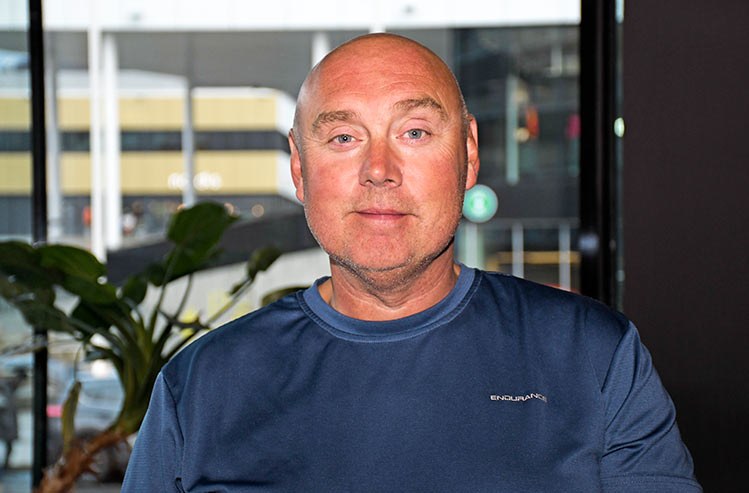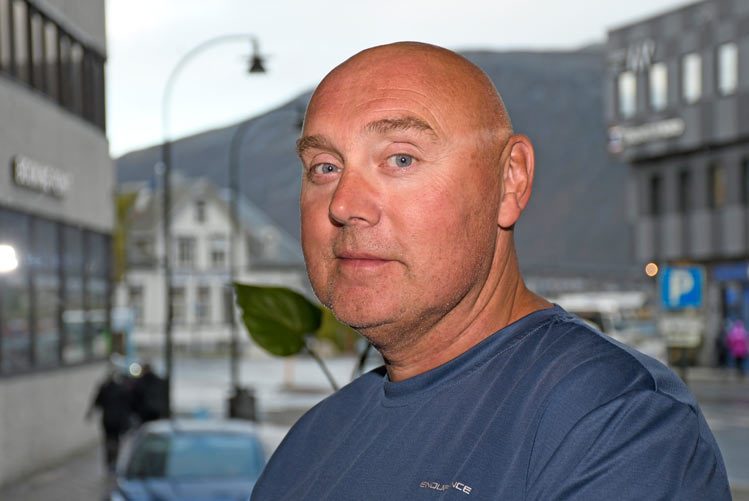Had "luck" as part of the treatment.
Anders Aavik (55) knows he was lucky. He avoided the gap in the treatment chain that people with substance use disorders often experience between treatment and aftercare. By the time he was discharged from hospital, he had found and joined a self-help group. Without it, Anders doesn't think he would have made it.

Anders Aavik is currently participating as a patient partner in the Dignity Care research project, hoping to contribute to a digital tool that gives both patients and therapists an overview. Anders wants to make it easier to highlight the patient's own resources and wishes, and to make it easier to identify gaps in the services the patient should have.
- I was lucky to get in touch with the self-help group early on. If I had been discharged and then started looking for help to stay clean, it would have easily gone wrong, he says.
There is still a gap in the service when patients return home after 10 weeks of drug treatment. Much of Anders Aavik's motivation in his work as a user representative today is to close this gap and to show the health service how patients can take responsibility for their own recovery. Using the patient as a resource is also at the heart of a person-centred health service.
Anders would like to see more guidance for substance abuse patients. He believes that they should start with self-help in their local community, or even set up a self-help service in communities where none exists, long before they are discharged from the specialist health service.
30 years of addiction
A digital tool with the right content can help health and follow-up services in both municipalities and hospitals to work better together. In a digital tool, Anders would also like to see a strong focus on the patient and for them to become aware of their own possibilities.
Anders has been drug-free for 14 years now. Today, he is open about his problems and doesn't want any secrets in his life. He has had enough of them. Until he went to see his GP at the age of 41, he had secretly taken drugs every day for almost 30 years. During this time, he went to school, studied and had a job.
- The addicts that society actually sees, those who are on the streets, represent only a small percentage of the total number. The vast majority of addicts live seemingly ordinary lives: They are employed, have families and are involved in the community. At the same time, they work hard to keep their addiction hidden from everyone and everything, he says.
Anders started experimenting with drugs when he was 11-12 years old. The boy then entered an environment consisting of outsiders - like himself. Here he was introduced to nicotine, sniffing and eventually stronger drugs.
He believes that the reason he became an addict was due to another diagnosis: Hypersensitivity. He believes it is congenital and that it will follow him for the rest of his life.
- This is not a diagnosis today, but it should be. I usually call it ABCD, he smiles and explains;
- I struggle to deal with all emotions, both good and bad. I've felt this way ever since I was little, and it made me feel different from an early age. This also led to me being picked out as a victim of bullying. Children quickly sense difference, he says.
The root of much evil
Anders believes that problems with managing emotions are often the underlying cause of several other disorders. Not only drug addiction, but also gambling addiction, self-harm, overeating and other eating disorders, for example. He believes it is important to provide both diagnosis and guidance while the children are young.
- Give children the opportunity to learn to identify emotions, and a safe arena where they learn to talk about emotions and get to know themselves. Not least, it's important to raise awareness of hypersensitivity and how quickly it can develop into other things if not addressed.
For Anders, substance abuse became a means of controlling his emotions. He didn't even realize that he had a substance abuse problem, even though he usually had to start the day with intoxication to make it work. But then, in 2008, Anders contacted his GP.
- I didn't go to the doctor with a substance abuse problem, but because over the past couple of years I had fallen into what I perceived as a mania. I felt slightly psychotic and paranoid.
Anders was referred on and sent between different psychiatric services for 10 months before a therapist realized that what Anders needed first and foremost was inpatient treatment for substance abuse.
- Just the fact that it can take so long to get the right help can be challenging for people in my patient group. But when I was finally admitted to a sheltered substance abuse unit, I had developed a very strong intrinsic motivation to seek treatment. I had a strong desire to start life anew, without substance abuse.
In addition, he had made contact with a self-help group while he was still in inpatient treatment. Anders is certain that this was his salvation.
- I don't think I would have had a chance to make such a big change in my life if the treatment had only been outpatient, or if I hadn't already been in the self-help group when they discharged me.

Removing triggers
- When I got home again, I went straight to the forest. Or rather, I took the dog with me and walked for hours in the forest. Long walks every single day, far away from all temptations. Then I had the self-help group in the evening, before I went home to sleep. In the beginning, I couldn't stay in my apartment for anything else. There was so much there that triggered me to fall back into old patterns. Eventually I got rid of those elements and have also redecorated so that the apartment looks completely different.
After his drug treatment, he got a job at the State Archives, while also working as a user representative for Blue Cross, Trondheim municipality, Helse Midt and research institutions.
- It was too much at the same time, so I was completely exhausted and had a mental breakdown. Today I receive 95% disability benefits. During the remaining 5% of a work week, I contribute as a user representative.
In Dignity Care, he participates as one of two patient partners from the organization RIO, Rusmisbrukeres Interesseorganisasjon. RIO was founded in 1996, and its purpose is to contribute professional and user knowledge in the field of substance abuse, so that people with substance abuse challenges get the help they need when they need it.
- I feel that being a user representative is a particularly important role. Personally, I'm most concerned with achieving better collaboration between different services, and not least preserving a diversity of treatment options, both public and private. It's very individual from person to person what works and what doesn't.
He makes no secret of the fact that life is often quite chaotic if you have an addiction disorder. It doesn't help that it's often difficult to find out where and how to get help.
- The only thing I'd heard about before I got treatment myself was these detoxification collectives - way out in the woods.
The future of healthcare
He sees a great need for what Dignity Care is working on, namely a kind of "user manual" on what IT systems should contain to help increase interaction between healthcare professionals and with the patient. Dignity Care has already presented its first prototype, "DigiTeam", a tool that will eventually be tested in a randomized controlled trial (RCT) to see if it actually contributes as intended. The aim is to get different caregivers at different levels to focus on the patient's own needs, work holistically, and thus more easily prevent further illness or relapse. Relapse prevention is essential for the lives of patients like Anders to function.
Capable of taking responsibility
Today, he believes that many patients experience drug and alcohol treatment in the same way as he did: That they must have considerable resources of their own when they first contact the health service. Both because getting the right treatment can take time, and because there are so many gaps in the treatment chain that patients are usually left alone to fill.
He likes the fact that Dignity Care aims to make it common for healthcare services to be person-centered, holistic and proactive. So that it works together with the patient to prevent more illness.
Using the patient as a resource is at the heart of person-centered healthcare. Anders knows that being seen as a resource and being helped to take responsibility for his own illness and health has been one of the most important factors in his own success with substance abuse treatment.
In a future digital collaboration tool, Anders wants to collaborate with more than just the health service. He would like to be able to enter into a dialog with, for example, NAV and volunteer helpers. Volunteer helpers are currently crucial to Anders' everyday life.
- I have reading and writing difficulties, so for me it would also be a great help if there were opportunities to use video or audio files in such a tool, both for me and for those around me.
Help for self-help
At the same time, he hopes that the tool will make it easier to find out what services are available and how to participate.
- Not least, such tools need a self-help guide for those who are unable to access aftercare in their home municipality. Starting something to help yourself and others can in itself be good aftercare. Often it is a lack of personal responsibility that leads us into trouble or creates additional problems. Part of it all is realizing that if you want to manage illness and improve your quality of life, you must take action yourself. I think this is important regardless of illness. You know your own illness best, so it's also important that you take personal responsibility for it," says Anders.
According to Anders, being able to talk to someone who experiences things in a similar way to himself is the best help there is. In such a community, he doesn't feel different, and he doesn't have to explain so much to be understood.
- I'm still part of the self-help group that I got in touch with, two days a week. They are a crucial part of my life. They will continue to be, so that I can have control over my diagnosis.